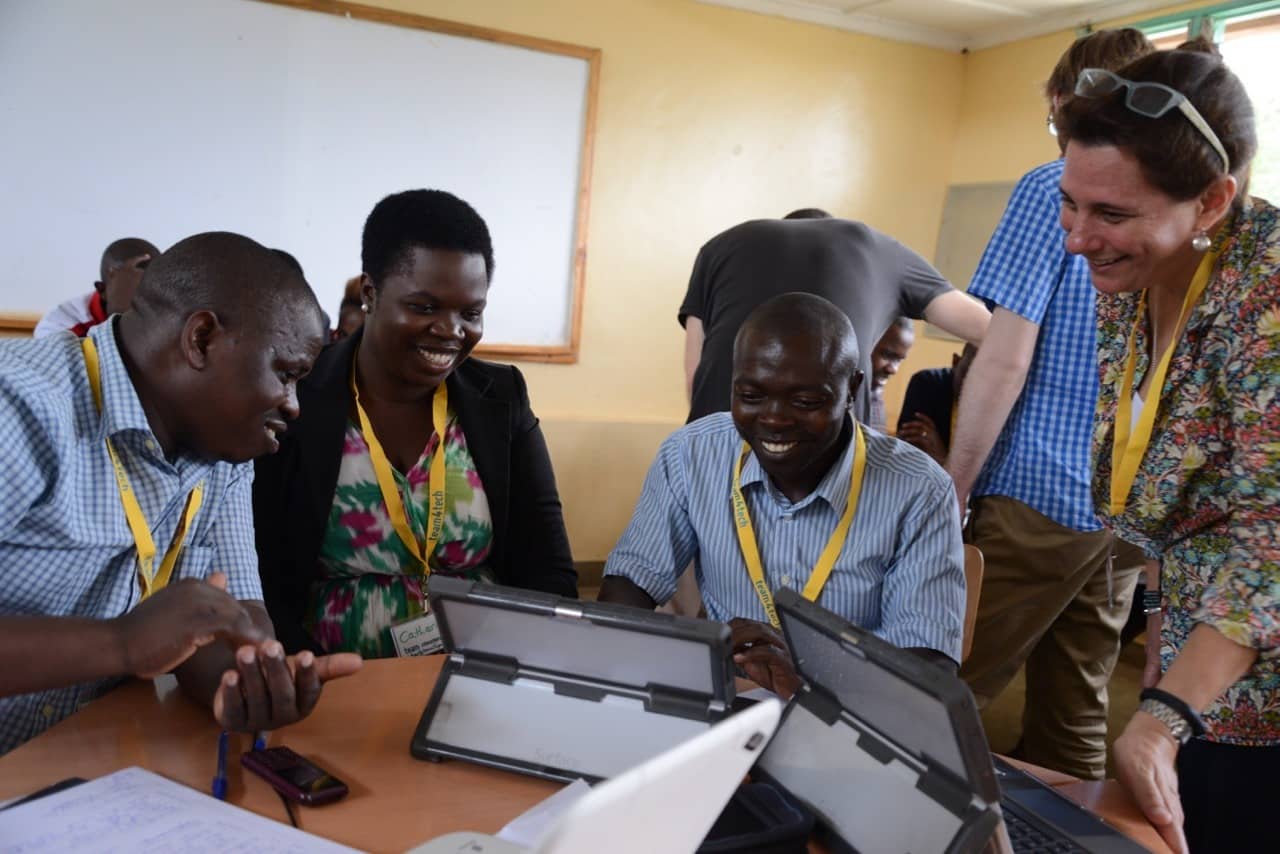Rwanda presents a challenging context for early literacy education due to its multilingual and broader cultural context. Research shows that technology can play an important role in addressing these challenges by facilitating solutions related to teacher training, literacy support outside the classroom, and delivering leveled materials to students. This blog reviews relevant technology solutions from education-focused nonprofit organizations around the world, including Team4Tech partners, that could be applied to the literacy challenges in Rwanda.
Language is one of the most prevalent challenges that literacy programs in Rwanda must focus on, especially given the complex history the country has had with their medium of instruction (MOI). Despite the logical reasons for the implementation of English in Rwanda’s primary schooling, the switch to learning in a second language has had consequences on student success. Both the Rwanda English in Action Program (REAP) and the Supporting Teachers’ English proficiency through Mentoring (STEM) initiative implemented by the Rwandan Ministry of Education in partnership with the British Council and the non-governmental organization, Inspire, Educate and Empower (IEE), have proven to be accessible and effective intervention programs in supporting teachers with their English. Teachers are supported through video courses on English language skills, as well as national monitoring teams, district mentors, and local peer groups to ensure that they receive sufficient support with English language instruction.
Pedagogical professional development is another vital aspect of Rwanda’s education program that is in need of progress. One of the main barriers to increasing reading achievement of students in Rwanda is the lack of high quality instruction. In Rwanda, the Literacy, Language, and Learning (L3) initiative showed promise in the use of school-based mentoring programs, audio resources, diagnostic tests, and teacher training colleges to create a more comprehensive and supportive system for teachers to develop better pedagogical techniques. The organization Inspiring Teachers works throughout Africa to deliver effective and efficient teacher professional development through the use of a mobile phone application, where teachers can watch videos of trained master teachers modeling teaching techniques mapped to the national content standards. Specifically, the program’s peer coaching method equips teachers with skills, tools, and support they need to give each other high quality coaching. This method of peer mentoring is notable for its scalability, as it allows for a sector-based approach where training can take place in the school. In addition, peer coaching addresses the problem of teacher to coach ratios which in low-resource contexts often exceed 200:1. In the peer coaching model, the coach to teacher ratio is 1:1 which makes sure no teacher feels neglected. The actual training workshops emphasize practicing techniques that can be used to tackle specific classroom challenges. Working in pairs, teachers observe each other in the classroom and provide targeted feedback. In Rwanda, Inspiring Teachers has partnered with Rwanda Action and Children Might Foundation (CMF) to provide programs for 510 teachers, impacting the education of 15,000 children. Overall, implementing an expanded nation-wide method for delivering easily accessible and effective teacher training through peer coaching, and the use of audio and video-based resources with local centers for teacher support is promising.
Another vital aspect that has proven to be important in literacy development is community values and engagement, especially as it relates to the home environment. Research shows that a rich home literacy environment not only kickstarts a child’s initial interest in reading but is also a milestone to later reading and educational success1. The implementation of Save the Children’s Literacy Boost Program in Rwanda challenges conventional literacy curricula and interventions to extend their implementations out of the school and into the greater community environment. Dost, a nonprofit organization in India, exemplifies the possibility of delivering educational tools to low literacy households by providing activities regarding early childhood development to parents of all literacy levels through mobile phone audio messages. Should Dost’s same method be applied in Rwanda, there would be an uptake in pre-school exposure to literacy skills and implementation of learning in the home environment. To achieve the goal of improving early literacy in Rwanda, it is necessary to focus on the development of an improved culture of literacy outside of the classroom.
Despite some continued challenges of scalability and relevance that Rwanda faces in their incorporation of educational technology, there are general improvements that technology is capable of providing for Rwanda: matching student levels, and providing better quality lessons. Nonprofit organizations around the world such as Pratham and Mindspark in India demonstrate the effectiveness of matching the skill level of students. Due to this, the International Growth Centre recommends that the Rwandan government look into adaptive learning software programs that could act in a similar manner. However, technology integration must not increase inequality in Rwanda’s education system by ignoring schools without the basic infrastructure to accommodate the new technology integrations. Future technology interventions in Rwanda must consider ways to provide necessary infrastructure and teacher technology training, as well as making sure their software programs are relevant to the students’ needs.
In sum, technology offers a promising solution to many of Rwanda’s challenges related to early literacy education. Rwanda could benefit from many of the solutions being developed and implemented by Team4Tech’s nonprofit partners around the world.
1 Sonali Nag et al., “Home Language, School Language and Children’s Literacy Attainments,” British Educational Research Association, last modified November 2018, https://bera-journals.onlinelibrary.wiley.com/doi/full/10.1002/rev3.3130.
